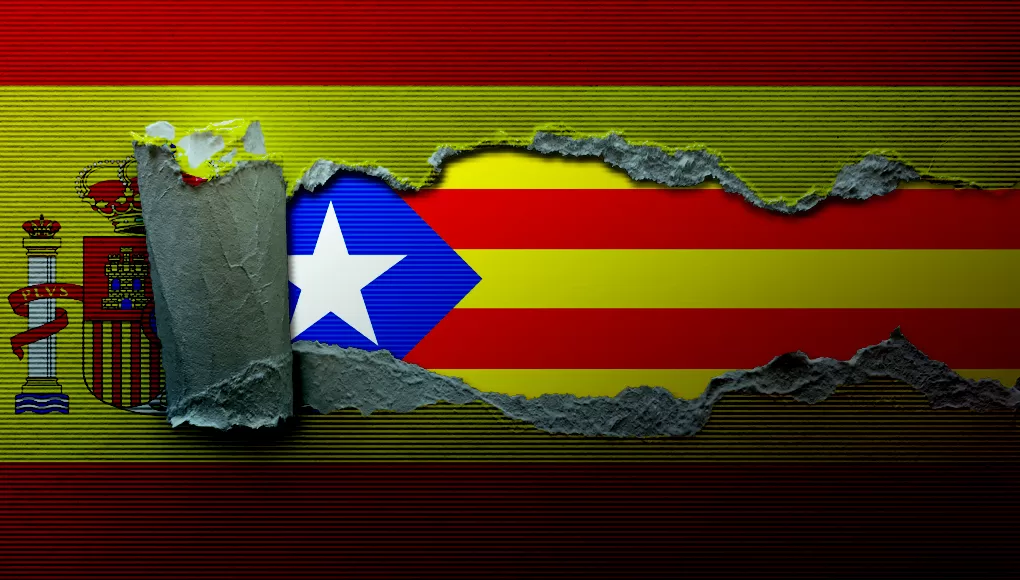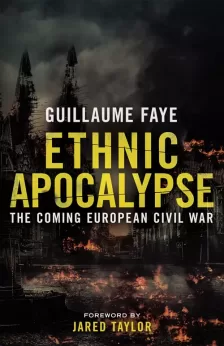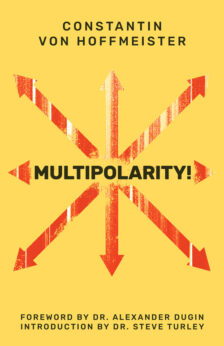Breizh-info.com: What is your point of view on the referendum in Catalonia? Hasn’t the Spanish government made a huge mistake in refusing to organize a consultation that could have turned out in its favour, had it not resorted to this violence and repression?1
Alain de Benoist: Regarding what is happening in Catalonia, I see my friends attached to an ‘indivisible’ units of the great historical nations, in opposition to my friends who are in favour of a Europe of regions, and both are reacting passionately. ‘Jacobinism’ against ‘Balkanization’! At the same time, classical arguments and habitual questions are resurfacing: Do Catalans have the right to be independent? Is it even in their interest to become so? Do they have the means? Why are they not content with the autonomy they enjoyed until at least 2010 (and which the minority peoples of France can only dream of)? Are the ‘secessionists’ ‘patriots’, ‘terrorists’ or ‘resisters’? Will the crisis degenerate into a civil war? Everyone has their reasons, and they are usually good reasons. The problem is that these reasons are irreconcilable.
I believe, to begin with, that we should leave vehemence out of the equation for a moment, and force ourselves to think.
Such a reflection might focus on the current evolution of the nation-state, which we know has been in crisis since the 1930s at least. What are the reasons for this crisis? This may also concern cases that are often considered parallel, whereas the parallel does not always run very deeply: the ‘free Quebec’ movement and the independence of Kosovo, the Catalan referendum and the referendum for the creation of a Kurdish State, the case of Padania, the fate of the Bretons, Corsicans, Flemings, Basques, Scots and Welsh, Kabyles and the inhabitants of the Faroe Islands, Tibetans and Inuit, to say nothing of the minorities of Central and Eastern Europe.
One could also mention the Civil War,2 the breakup of Yugoslavia, the vote that allowed the Crimea to return to Russia, and also the conditions under which the French departments of Algeria ceased to exist. All these cases have something in common, but we can also see that each of them is different.
Finally, we might wonder about the meaning that the word ‘independence’ can still have in the era of globalization. A ‘big’ country like France has already lost its independence in many areas. How could a ‘small’ state be better off?
Personally, I am also quite embarrassed by the economic dimension underlying certain forms of independence: the rich regions often want to secede because they refuse to continue to ‘assist’ the poor regions (from Sicily to Andalusia). Let us not forget that Catalonia alone accounts for 20% of Spain’s GDP. There is an egoistic reflex that I totally condemn because it is fundamentally unsound.
That being said, it is clear that there is a specific Catalan identity and that a very large number of Catalans, probably a majority, now aspire for independence. It is equally clear that Catalan independence is for the moment being reinforced by the showdown, while, by doing too much or too little, the pathetic Mariano Rajoy, whom Emmanuel Macron has seen fit to support, has been discredited by the outcome of this crisis, in which he has only proven his awkwardness, indecision and mediocrity. On October 1st, the daily El País ironically said that Rajoy deserves to receive the Cross of Saint Jordi (the highest Catalan decoration), because no one has done more than him to convert the Catalans to independence…
Rejecting the results of the referendum on the grounds that it was ‘illegal’ was a serious mistake. In such cases, it is not legality that counts, but legitimacy (which can obviously be appreciated from various points of view). The Southerners of the United States paid very little attention to legality when they decided to secede from the Union, and the Irish heroes of Easter 1916 did not need legal authorization either to take up arms. But one could say the same thing about the vast majority of the great events that decided the fate of peoples in the past. In the case of the ‘exceptional situation’, in the Schmittian sense of the term, legality means nothing.
Legitimacy is linked to popular sovereignty, which, in my view, is more important than national sovereignty. It is the people, as a constituent force, that is the source of legitimacy. Now, there is a Catalan people, just as there is a Scottish people, a Québécois people, a Corsican people, a Breton people, and so on. For centuries, this people has been associated with the history of the Spanish nation, whether through consent or by force. Today, it apparently wants to put an end to this association. Whether you like it or not doesn’t change a thing. It must be noted. Nor do the current orientations of the Catalan government, which in my opinion are detestable in many respects, change anything either.
The people, both as ethnos and as demos, as a people ‘in themselves’ and as a ‘people for themselves’, as an inherited people or as a people under construction (but as individuals, a people are never built from scratch), must be considered sovereign in a democracy. It must be free to decide as much as possible by itself and for itself. To say that a people does not have the right to decide for its country is a contradiction in terms: this is, in fact, the first thing on which it must be able to decide. There is no strength in a country which, rightly or wrongly, no longer recognizes itself or a people that wants to establish itself as a state.
To answer your question, I am neither hostile nor favourable to the independence of Catalonia. I think it’s up to the Catalans to decide.
Breizh-info.com: Let’s talk about the French situation. What did you think of the ‘brand new’ speech of Marine Le Pen in Poitiers in which she quotes Homer and Charlemagne? Is this change of course surprising?
Alain de Benoist: Let’s take a step back. This year we witnessed an earthquake that led to a complete breakdown of the political landscape. The essential fact, in my opinion, is that for the first time in the history of the Fifth Republic, in the finalists of the second round of the presidential election one could recognise in neither candidate the left-right divide. The two parties that were the major vectors of this division took a historic beating:3 the PS is in agony,4 the Republicans are in ruins (you will also have noticed that there is a word that no longer leaves the mouth of Jean-Luc Mélenchon:5 ‘left’). This is an acceleration of the process I anticipated in my book The Populist Moment. Right / Left, It’s Over! (Pierre-Guillaume de Roux, 2017). One political system has been erased, another system is yet to be born. The reformation will take several years.
The FN will not escape this reformation. In separating from Florian Philippot,6 who attracted all sorts of criticisms for his character (perhaps more than for his ideas), Marine Le Pen lost both her right hand and her lightning rod. For my part, I was totally hostile to Jacobinism, secularism and the enmity of principle in Philippot’s Europe. On the other hand, I approved of his political position, and if I had any reproach to make against him in the economic and social field, it would have been that he was far too shy in the fight against capitalism!
We will not change course by citing the names of celebrities and, despite their immense merits, neither Homer nor Charlemagne will tell us what social and political system must be established! To put it another way, I do not really believe in an in-depth change along the ‘line’ of the Front National.
We will mainly witness cosmetic inflections (less talk about the Euro and more about immigration). That said, the real problem of the Front National is probably not a question of people or a question of programme. It is rather due to the fact that it also already comes across as a ‘party of before’, a party before the great transformation presently underway. That’s why I’m not optimistic about its future.
It is wrong to reason in terms of a political apparatus at a time when everything that apparatus does is no longer capable of seducing anyone. There is need for doctrinal clarification, but no one seems to have the desire or the ability to engage with it. Those who criticize Macron on the right, for example, do not hide their approval of his abominable Labour law: they would like to see it implemented by François Fillon. The media is now saying that the proof that Macron’s tax policy is right is that it ‘favours the richest’. If the right wants to exist, it is this equivalence that should first be broken with. As long as the right is a soup served to the rich and the powerful, it will exist without me!
Breizh-info.com: Are you inspired by the growing trade between North Korea and the United States? What do you think are the real reasons for this escalation?
Alain de Benoist: The escalation in question has mainly resulted, so far, in incandescent statements, troop movements, posturing, ranting and insults. At the same time, we forget that in seeking to acquire a nuclear weapon, North Korea – a country for which I have no particular sympathy – does nothing more than what the United States, Russia, France, Israel and many other countries have done before. Why would only some countries have the right?
Those who speak of ‘the threat of North Korea’ (but never the threat of the US) also forget that the atomic weapon is, above all, a weapon of deterrence. For Kim Jong-un, such a weapon is nothing more than a way to guard against outside intervention against him. We understand that this hinders those who would like to eliminate him, as they have eliminated Saddam Hussein or Gaddafi. A country endowed with a nuclear weapon will never attack a country which possesses one itself, because it knows that its offensive would be immediately followed by a riposte that would vitrify it in return. In every region of the world, it is not so much nuclear proliferation that is dangerous, as monopoly. That’s why the best way to make North Korea’s nuclear weapons harmless would be to help South Korea and Japan acquire them too!
Trump and Kim Jong-un may be nuts, but they are not crazy (at least we hope not). In order to allow them to compete in their jester-style, perhaps they should compete via their respective hairdressers!
Breizh-info.com: In this month of October, what are the books that, since the September literary and political comeback, have caught your eye?
Alain de Benoist: In a general sense, I really don’t like things that try to catch my eye! I recommend Pierre-Guillaume de Roux’s reissue of Paul Sérant’s Fascist Romanticism, enriched with an excellent preface by Olivier Dard, and Carl Schmitt’s Land and Sea, which I have prefaced myself.
On the literary level, The Cenotaph of Newton by Dominique Pagnier (Gallimard), and The Supernumerary Man, Patrice Jean (Rue Fromentin), are two superb novels. For the rest, apart from whodunnits, I am currently reading only theological treatises on original sin, for a work in progress.
References
1The Spanish government responded to attempts to carry out a referendum on Catalan independence within Catalonia on 1st October 2017 by attempting to blockade voting stations and sending in both Guarda Civil and the National Police Corps, as well as declaring the result illegal. – Trans.
2 De Benoist is likely here referring to the Spanish Civil War (1936–1939). – Trans.
3Traditionally French politics, much like its English counterpart, has been dominated by a ‘conservative’ Right (Les Republicans) and more socially inclined Left (Partie Sociale). – Trans.
4Partie Sociale. – Trans.
5Jean-Luc Mélenchon is the leader of the French political party La France Insoumise, which in the 2017 French presidential election shocked the traditional political establishment by its success, much like Le Penn’s Front National. Its politics is broadly left-wing, populist and vaguely Euro-sceptic.
6Florian Philippot is an MEP and an ex-Vice President of the Front National. In September 2017, he left the FN to found his own party, Les Patriots, on a nationalist and Euro-sceptic program. – Trans.







